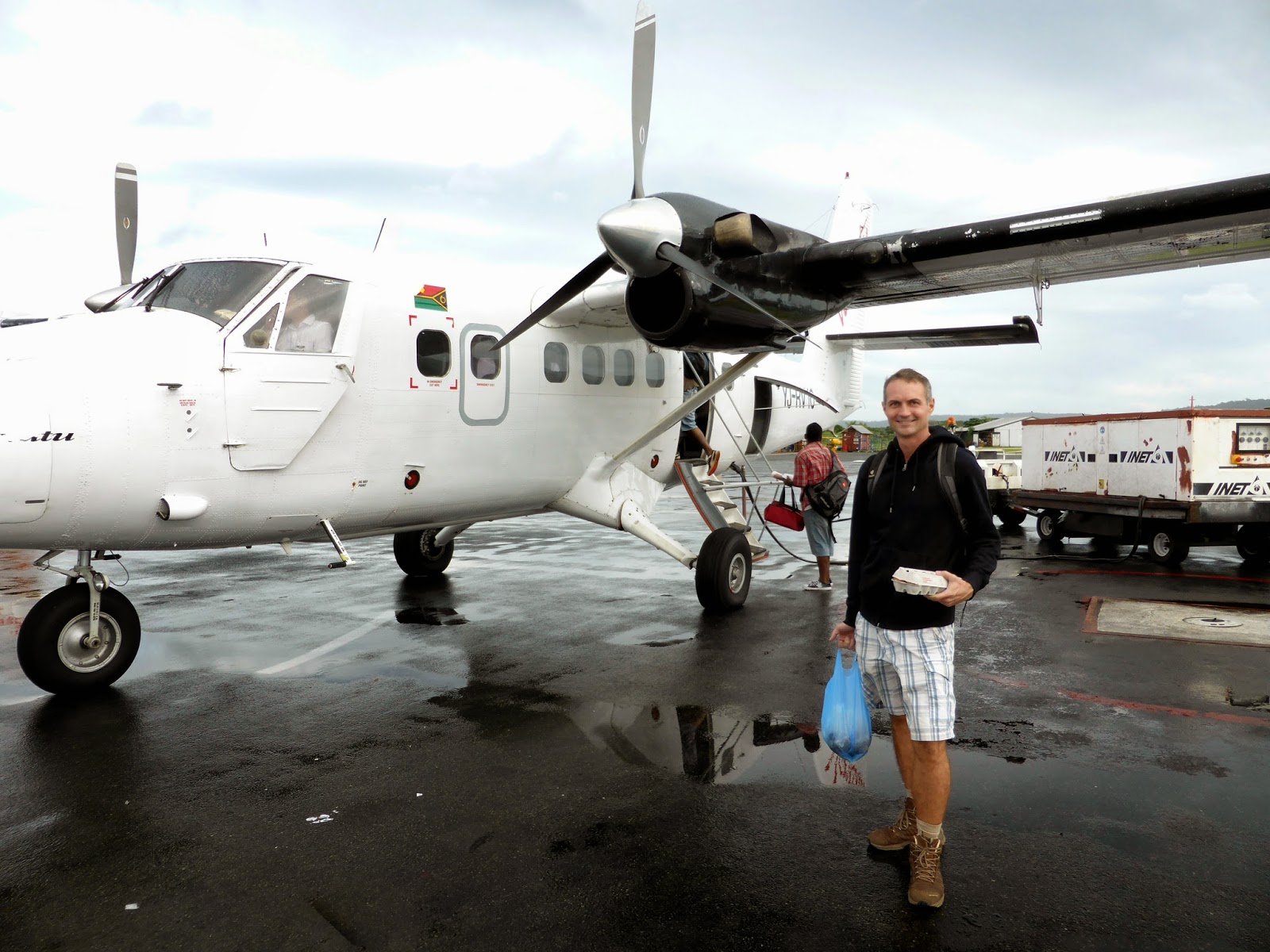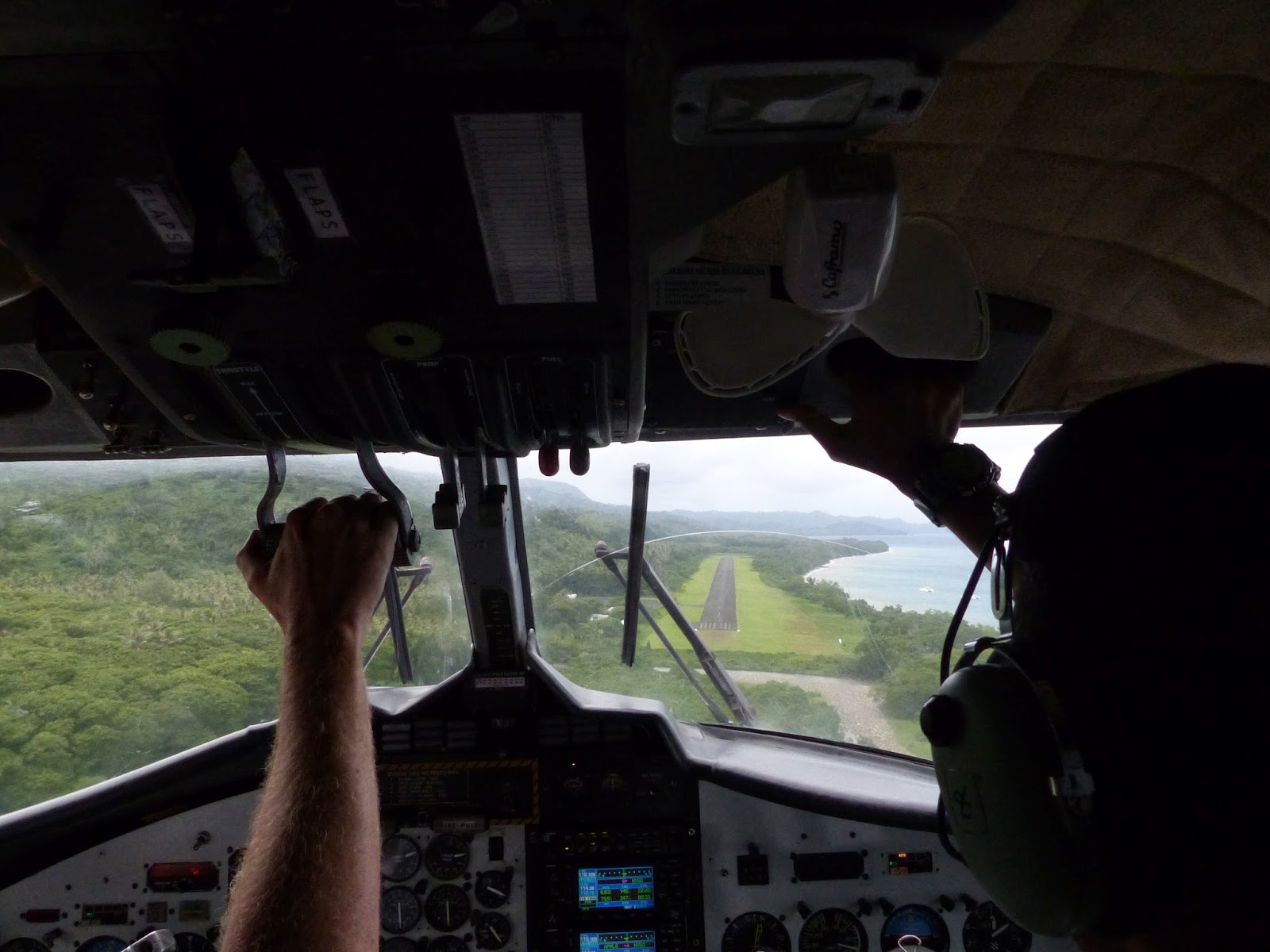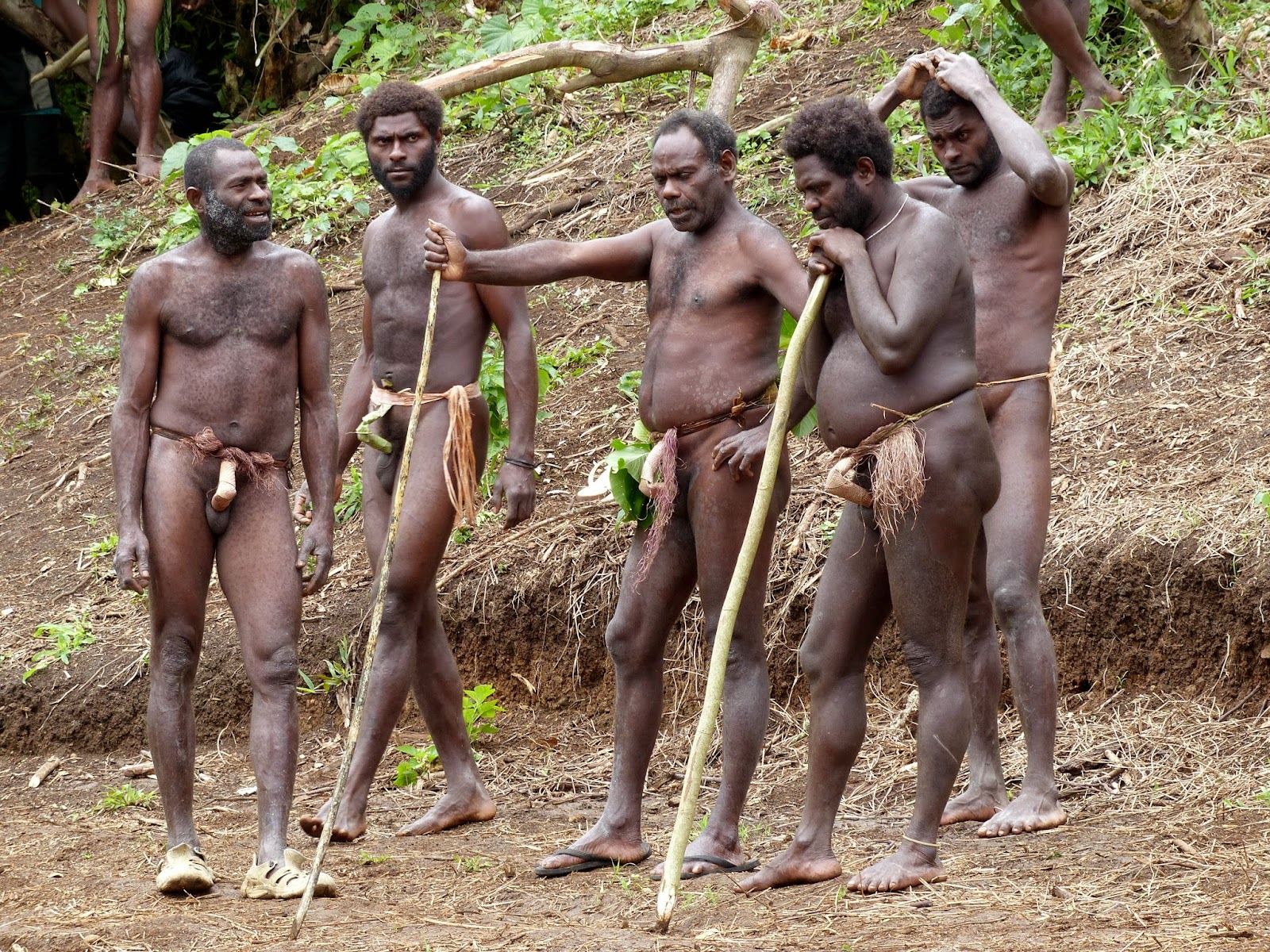The fun with our next destination
within Vanuatu archipelago - Pentecost Island started even before we
took off. Once, the proprietress of our small hotel in Port Vila
heard that we are heading to Pentecost, she asked if it would be a
problem for us to take a package for the owner of a lodge where, by
the way, she booked us a room.
The package turned out to be a plastic bag of beef
meat (around three kilos) and a typical cardboard case of 12 eggs.
Why, on Earth, would anyone bother to get someone else to carry a 3kg
of beef meat and a dozen of eggs? Honestly it is hard to imagine the
products that are easier to come by. So we asked the gentleman who
brought it this question. Without losing his composure, he cheerfully
replied that on Pentecost these products are actually not so easy to
came by - the deliveries by cargo boats are very unreliable, the
electricity on cargo boats is even less reliable, so the food gets
frozen and unfrozen many times. And Silos does not want his guests to
be left starving or get poisoned.
It's important to add that it was still
the same day when we had the emergency landing, the torrential rain
kept on falling almost ceaselessly and the heavens over Port Villa
were more grey than the sky over Brussels (and as you may know
Brussels is really hard to beat when it comes to gloominess of a
rainy day). Moreover, Ieva just started reading 'Happy Isles of the
Oceania' by Paul Theroux, where the author travelling across
Melanesia, keeps on grumbling that the food is awful and mainly
consists of canned beef and Spam. Our morale went seriously down, we
were supposed to have a relaxing holiday in the Pacific paradise; a
happy end to our seven months wandering across the globe. Instead, it
looked like the most adventurous, painful and culinarily austere part
of our trip was about to start. In normal circumstances, we would say
great, but, as just mentioned, it was seriously out of sync with our
expectations.
The next day, the sun in the sky was
back, and once we approached Air Vanuatu check-in counter and ostensibly
placed the beef and the eggs on it we even found
the whole situation quite enjoyable. Indeed, they carefully weighted
our check-in luggage as well as ourselves, but did not ask a word
about the carry on items. After a couple of more flights we clearly
understood what the 'delivery man' meant by: Air Vanuatu is
frighteningly relaxed about any security rules'. During these two
weeks no one even made a suggestion of checking what was in our
luggage and often no one even checked our passports (to verify if our
names match the ones printed on the boarding pass, let alone often we were not even issued with a boarding pass). However, they
continually put us on the scales or at least asked what our
weight was.
The passengers' body mass matters a great deal if you fly on
20 seater twin Otters that seem to rule in the Pacific skies.
The flight was rather bumpy and the
landing in Pentecost was extremely bumpy with a very strong
side-wind so the safest place for our eggs was in ... the cockpit :).
While we were jolted up and down, the young pilot
gave us reassuring looks and thumbs-up from the cockpit. Once safely
on the ground he asked: 'So, how many bags today'? He meant air-sickness bags; the answer was three bags, but all for only one (tourist) girl
– poor thing she really suffered, the tears dripping down her
cheeks. As far as we were concerned, after our previous day landing
on the grass, we were prepared for trouble, so eventually in quite a
good shape. Once off the plane, we were handed hibiscus blossoms, we picked our luggage straight from the aircraft...
... an got entertained by the the 'welcome committee' - friendly villagers and a local music band
(of course our landing in good, old Zambia came to our minds :)).
We
soon found out that we were the only plane that managed to land out of the scheduled
five due to strong winds (that made our landing so bone-shaking). The remaining planes as well as a huge
cruise-ship (we could, actually see it rocking on the waves in the distance as the airport
was virtually at the beach) were diverted to other islands. We don't
wish anyone bad, but it turned out to be a blessing for us, as the
ambience at the 'land-diving' ceremony was so much better without the few hundred cruise-ship passengers.
We would hate to sound repetitive,
boring or pretentious, but the sentence: 'something... exceeded our
expectations' runs the risk to be a bit overused while we account on
what happened in Vanuatu. Nonetheless, this is exactly what we can
say about the 'land-diving' ceremony. The whole thing looks totally
surreal at best or completely irrational and outright dangerous at
worst. In any case, the whole event is great fun. The seventeen or so meter-high diving
tower looked like a monstrous medieval war machine.
When we arrived
at the site (a pleasant five minutes walk from the 'airport' or more
precisely the 'airstrip'). The 'divers' were already preparing the
ground for the jumps; they were preparing the ground literally - they
were turning the soil over with shovels and rods to make the landing
softer. Usually, there is nothing exceptional about men digging in
the ground in the Tropics, but not in Vanuatu … as the whole
garment of these hard working gentlemen consisted only of a small
leaf wrapped around their penis...
... while their backside were shining in the sun.
This leaf cover is called namba and according to the size of the leave (allegedly nothing to do with with the size of the thing the leaf covers) there are two main groups - big nambas and small nambas. The land-divers are small nambas.
The tower had several
jumping ramps, located at different heights. A pair of lianas (a
woody climbing plant that ubiquitously hangs from trees in the
tropical forests) was fastened to each ramp. The legs of the divers
are attached to these lianas. The lianas are meant to absorb the
impact of the dive. That's why some of the people call Pentecost
land-diving a precursor of bungee jumping. There is one caveat though
– whereas the bungee lines have great elasticity, the Pentecost
lianas have almost none (I checked myself by pulling on them).
While the divers jump head down, the
local men and boys (in traditional outfits described above) and local
women and girls perform traditional dances and cheer the brave guys
up.
The clothing of women consists of grass skirt wrapped around the
hips and that's it, the chest is bare...
... and in Vanuatu it's the XXL size that is considered very sexy :)
There were more or less
eight jumps each consecutive one from a higher ramp. Each ramp can be
used only once as it breaks while the lianas get fully stretched
saving the divers from hitting the ground with the tip of their
heads. Actually, given that lianas are inelastic, it is a very smart
system - the diver hits the ground with not so much impact because
the breaking ramp absorbed most of the free fall's energy. Still, such a jump is a huge shock for the body, that's why the jumpers need to start to practice this 'sport' at an early age and they are allowed to climb higher ramps only after years of 'training'. The final
'athlete' dived more than seventeen meters to the great applause of
everyone.
The legend has it that a wife running
away from her husband (no one knows why she was escaping, however
everybody knows that the Melanesian men were not very kind with their
women, so this scenario is likely) climbed a high tree and cleverly
fastened herself to lianas. While the furious husband caught up with
her, she jumped down and the stupid man dived after her. The lianas
cushioned her fall and she survived, whereas the unsecured husband
... not hard to guess - bit the dust. This, allegedly inspired the
Pentecostians to perform the dives. Some wise, old man came up with
the yam harvest connection and the tradition took off to our great
contemporary enjoyment. The facts about the land-diving ceremony are
hard to find out - no one really knows how old it is; reportedly, it
appears already in the accounts of a Christian missionary in the
first half of the nineteenth century. The ceremony traditionally used
to be performed in May to ensure a plentiful yam harvest. What is yam
you may ask – it is an edible tuber plant (to us it looked similar
to cassava), apparently very appreciated in the whole of Melanesia
(though with rather bleak prospects to become a hit in our latitudes
as for us it just tastes ...well... tasteless). No one can really
tell how the locals came up with the idea that this kind of activity
will bring a good harvest.
The seventeen meter-high jump concluded
the ceremony, miraculously no one got hurt, so in good spirits
everyone went home whereas ourselves with a couple of other tourists
(exactly five including us) set off to check into the Silos' lodge.
We got a lift on the rim of a pick-up truck, together with a
village chief and his supplies, including an alive rooster, the rooster's paws were tied and he was so silent and still that it took us some time to realise that it was not dead.
We also liked a lot his
baskets made out of palm leaves, that are omnipresent in Vanuatu, and
usually used to carry fruits. The ride on a narrow dirt road took
around half an our and included two streams crossings (there are no
bridges on Pentecost). At Silos' we were very warmly greeted by four
congenial Melanesian ladies, wearing loose frocks (the outfit that
was most likely recommended by local missionaries), they all
introduced themselves by name, took good care to memorise ours, and
put flower necklaces around our necks. Silos' lodge consisted of a
couple of cottages or rather traditional huts made out of rattan,
with a thatched roof. They were very simple, though they protected
perfectly from the tropical heat, with no need of any
air-conditioning. The Pacific beach was no more than 30 meters away.
We set off for a short hike along the beach and on the way we spotted
a waterfall in the distance.
We passed through a village nearby whose
residents were super friendly to us and showed us the path to this
surprise cascade.
The locals greeted us with very wide smiles, the kids were as cheerful as in Africa and some of them had super cool, blond frizzy hair. At first they they were shy and even a bit afraid of 'pale-skin' people like us, but after a short while as long as their mama was around, they became super excited that they could approach us.
The view of the waterfall and the feeling of its
refreshing spray on our skin put the smiles on our faces at their
widest. In the end, in spite of all our misgivings the day before, it
looked like our Pacific, idyllic holiday was about to start :).
























No comments:
Post a Comment